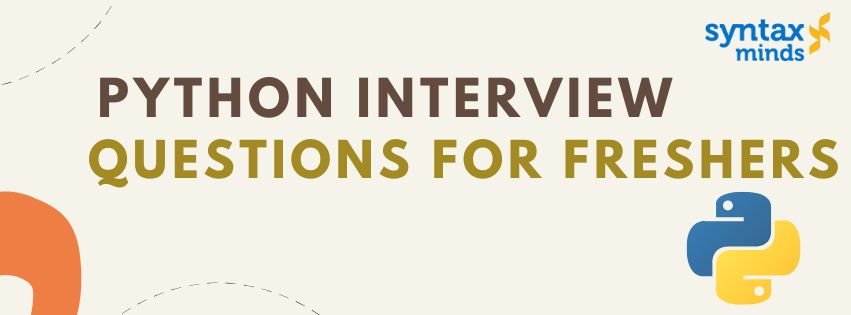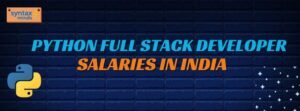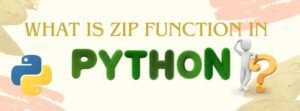Table of Contents
TogglePython interview questions for freshers
Here are 30 important Python interview questions for freshers (beginners) that cover a range of topics including basic concepts, data structures, object-oriented programming, and libraries commonly used in Python development.
Basic Python Concepts
- What is Python?
- Explain what Python is and its key features (e.g., high-level, interpreted, dynamic typing, etc.).
- What are Python’s key advantages?
- Discuss Python’s readability, simplicity, large standard library, and community support.
- What are the different data types in Python?
- List common data types such as int, float, str, list, tuple, set, dict.
- What are the differences between Python 2 and Python 3?
- Discuss changes like print function, integer division, Unicode string handling, etc.
- How is memory managed in Python?
- Explain Python’s automatic memory management using garbage collection.
- What are mutable and immutable types in Python?
- Explain the difference and provide examples (e.g., lists are mutable, strings are immutable).
- What is the use of the pass statement in Python?
- Describe how pass acts as a placeholder for future code and is used in loops, functions, and classes.

Control Flow and Functions
- What are the different ways to handle exceptions in Python?
- Discuss try, except, else, and finally blocks for exception handling.
- What is the difference between break, continue, and pass in loops?
- Explain each of these loop control statements with examples.
- What are lambda functions in Python?
- Describe anonymous functions using the lambda keyword.
- What is a function argument in Python? What types of arguments can be passed to functions?
- Discuss positional arguments, keyword arguments, default arguments, and variable-length arguments (*args and **kwargs).
- What is recursion in Python?
- Explain how recursion works with an example.
- What is the difference between del and remove() in Python?
- Discuss del (deletes variables or elements) and remove() (removes elements from a list).
Data Structures
- What is a list in Python? How is it different from a tuple?
- Discuss mutability, performance, and usage differences between lists and tuples.
- What are dictionaries in Python? How are they different from lists?
- Explain key-value pairs in dictionaries and the differences in how lists and dictionaries store data.
- What is a set in Python?
- Describe a set’s properties (unordered, unique elements) and how to use them.
- What is list comprehension in Python?
- Explain the syntax and provide examples of list comprehension for creating lists concisely.
- What is a generator in Python?
- Discuss how generators are used to iterate over large data sets using the yield keyword.
- How does Python handle slicing in lists and tuples?
- Explain the syntax for slicing and its use for selecting specific portions of lists/tuples.
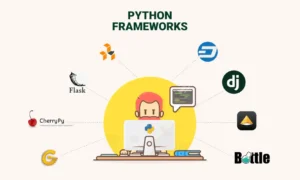
Object-Oriented Programming (OOP)
- What are the four pillars of Object-Oriented Programming?
- Explain Encapsulation, Abstraction, Inheritance, and Polymorphism.
- How do you create a class in Python?
- Provide an example of a class definition with attributes and methods.
- What is the difference between __init__() and __del__() in Python classes?
- Explain the role of __init__() for object initialization and __del__() for object destruction.
- What is inheritance in Python?
- Discuss how a child class inherits attributes and methods from a parent class.
- What is polymorphism in Python?
- Explain the concept of polymorphism and provide an example of method overriding.
- What are class methods and static methods in Python?
- Discuss the differences between @classmethod and @staticmethod decorators.
Libraries and Modules
- What are modules and packages in Python?
- Explain the concept of a module (a Python file) and a package (a directory of modules).
- How do you import modules in Python?
- Demonstrate various ways to import modules (import, from module import, import as).
- What is the purpose of the os module in Python?
- Discuss how the os module helps interact with the operating system (file handling, environment variables).
- What is the difference between deepcopy() and copy() in Python?
- Explain shallow and deep copies, and how copy() creates a reference copy while deepcopy() creates a fully independent copy.
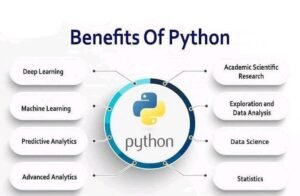
Advanced Python Concepts
- What are decorators in Python?
- Explain how decorators are used to modify the behavior of functions or methods in Python.
Bonus Questions (for extra challenge):
- How does Python handle memory management?
- Discuss garbage collection, reference counting, and memory management strategies in Python.
- What is the Global Interpreter Lock (GIL)?
- Explain the role of GIL in multi-threading in Python and its impact on concurrency.
- What is a Python iterator?
- Define iterators and explain how the __iter__() and __next__() methods work in custom iterators.
These questions cover a broad range of topics that are commonly tested during Python interviews for freshers. If you’d like to focus on any specific question or need help with explanations or code samples, feel free to ask!

